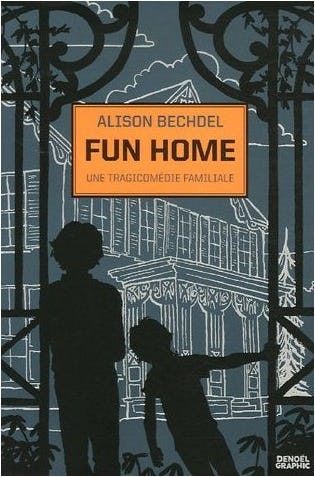Table of Content
If you mostly read books via Kindle or another e-reader, do yourself a favor and borrow or buy the printed version of this one. I was so glad I made the investment to enjoy the power of how Bechdel's illustrations told as much of the story as her words. While this wasn't perhaps as good as I had expected it to be, it still is powerful, and I'll remember it for some time to come.

Once I start a book, I have a hard time stopping and just don't want to get myself where I can't get out and it's too late. I can’t really say I enjoyed this book — I found it dark and disturbing in many ways. I think I read it pretty much straight through. I'm a herosexual males, and picked up this book, after reading an article Bout how the right-wing states banned it from libraries. Excellent read, and though I'm hetero, I get the dysfunction. By essentially putting her father's homosexuality and pedophilia in the same category, this author is perpetuating EXTREMELY harmful and negative stereotypes about gay men.
What Our Readers Are Saying
Even without considering the graphic element, the writing is labored verging on tortured. The narration consists of endless confused comparisons of her family's situation to classic literature. I don't object to allusions when they are deployed to refine the writer's own vision of the narrative. But Bechdel's dependence on literary allusions don't feel like attempts to illuminate -- they obscure; they waffle about for a few pages a time before being replaced about by other thin allusions.

And the story itself, the misery and the humor of the characters, the events, and the time period, must be thoughtfully digested. The book is divided into seven chapters, each based on a different theme in the author's childhood and young adult life. Before my to psychobabble gets the better of my good sense, let me come clean about my personal reasons for rating this work as high as 3.5 stars.
Current book
This is clearly an adult book, and not a comic book in any sense of the word. It’s similar in style and substance to books like “House of Happy Endings” by Leslie Garis and “Running with Scissors” by Augusten Burroughs, and would appeal to the same audience, but I thought this story was enhanced by the visual presentation. I particularly liked the little snippets of letters and envelopes and photographs…they just made this story feel real to me.

It’s all clever and interesting stuff and is well written. The potential destruction the father could have worked on the daughter by living might be read in the baroque level of detail this graphic novel has, despite being authored and illustrated by a self-professed modern minimalist. Instead of spare lines and empty spaces Allison Bechdel fills her book with the gingerbread latticing, velvet flocked wall-paper and intricately carved bannisters of her father's pretentious Victorian tastes. But it's not clear how much credit we are to give to this narration, and how much the point of the narrative is to expose its own tenuousness.
plus-circle Add Review
The Secret to Superman Strength is her third graphic memoir. Alison Bechdel has been a careful archivist of her own life and kept a journal since she was ten. Since 1983 she has been chronicling the lives of various characters in the fictionalized Dykes to Watch Out For strip, "one of the preeminent oeuvres in the comics genre, period" (Ms.). The strip is syndicated in 50 alternative newspapers, translated into multiple languages, and collected into a book series with a quarter of a million copies in print. Utne magazine has listed DTWOF as "one of the greatest hits of the twentieth century."
Due to this, I actually find myself a little bit distracted, over-examining many of the frames in order to try to parse just why this story needed illustrating. I did that a lot in this book too, and while I didn't come to a clear answer, I did find many frames that were not just augmented, but wholly changed, for the better of course, by the compliment of the illustration. In this groundbreaking, bestselling graphic memoir, Alison Bechdel charts her fraught relationship with her late father. In her hands, personal history becomes a work of amazing subtlety and power, written with controlled force and enlivened with humor, rich literary allusion, and heartbreaking detail. In fact, this whole book is an attempt by the author to explain her troubled relationship with her family and society in general through epoch-making novels - mainly The Great Gatsby, In Search of Lost Time and Ulysses.
You see, I'm not really a fan of graphic novels, but it worked here to illustrate her points. However, this whole book felt more like a project of self-analysis than a commercial product. It was extremely personal, yet cold and detached--like Alison's parents, which I think is the entire point. My rating and review are thus reprehensibly subjective.
Alison can also make the most simplistic details - Road Runner on the TV; period cars; recurring appearances of the Sun Beam Bread logo - realistic, melancholy, and heartrending all at once. Goodreads helps you keep track of books you want to read. Alison ends the story with an image of her jumping off a diving board into a pool as a young girl, with Bruce there to catch her. Alison narrates that Icarus—and Bruce—did hurtle into the sea, but Bruce “was there to catch” Alison when she leapt. Shortly before Bruce’s death, Alison narrates that she had an eerie dream in which the two of them try to view a sunset but Bruce, lagging behind, misses it.
It delves into imperfect parents, fluid sexuality, and the messy quality of the human psyche overall. It serves as one of the most standout books on the college syllabi given to me thus far. A graphic novel memoir about a girl who grows up with a repressed, homosexual father and later comes out as a lesbian, only to have her dad die a few days later - how different.

At Bruce’s funeral, Alison becomes irritable and wishes she could speak the truth about Bruce’s death, but instead keeps quiet. Alison wonders what might have happened if Bruce had been able to escape Beech Creek and live someplace else. She discusses the landscape around Beech Creek, which is both naturally beautiful and industrially polluted. As a young girl, Alison decided to write a poem about nature, and Bruce added a stanza onto it.
I did like how something that Alison Bechdel mentioned in the first half would then get completed in the second half. And I learned quite a lot about funerals, which I was not expecting going into this. Also, Bechdel taking the time to discuss her OCD was crucial and enlightening. I'm sorry Ms Bechdel but if this is your attempt at cracking a joke on the likelihood of your gay self having a conversation with your gay dad about well being gay, it's kind of pathetic.
So much so, there could be several individual books written on any 'one' theme. Everyone, especially daughter and father, have their problems with gender roles stereotypes they can´t live because she is a tomboy and he a feminine man. As if parent child relationships weren´t already difficult enough, this adds an underlying criticism and satire to the values a society wants to implement into all citizens. That said, you're more likely to enjoy it if you're a recovering English major. Or if you're a fan of queer culture, autobiographical fiction, or non-superhero graphic novels.
Having lost a father at 14, I know how it feels trying to grasp at straws, trying to analyze one seemingly inconsequential incident or subjecting one precious shared moment to intense and concentrated scrutiny from all possible angles. But you know it's just delusional thinking anyway. You will never know him the way you could have.

Her father's death was ruled an accident -- he stumbled into oncoming traffic while clearing a lot. Even if the death was willed, the narrator herself provides plenty of evidence for other constructions of what could have caused the suicide. A man whose rage for order verged on Mommy Dearest, the father clearly suffered from a mood disorder, narcissism, and even a tendency to kleptomania -- none of which are endemic to homosexuality, even of the closeted sort. The man was unpleasant, clearly disturbed and distraught by his wife's recent request for a divorce. I'm looking forward to reading Bechdel’s newest graphic book, Are You My Mother, the story of her relationship with her mother. The book was published when Bechdel was in her mid-40s, and tells the story of her own life, up to just before her twentieth birthday, and her father’s life, up to the same point in time, when he was run over by a truck - possibly accidentally, possibly as a suicide.


No comments:
Post a Comment